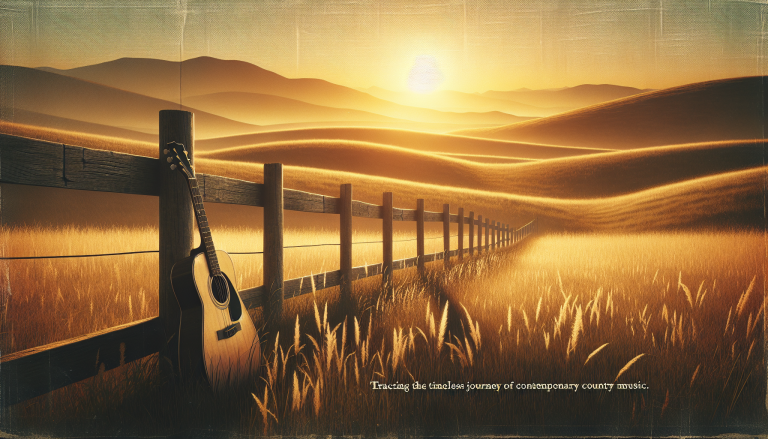The Roots and Resonance of Contemporary Country

In the vast landscape of American music, contemporary country stands as a vibrant and evolving thread woven deeply into the cultural fabric. Born from the rich traditions of classic country but blossoming with modern flair, this genre resonates with listeners who crave stories that are both timeless and timely. To truly appreciate contemporary country, one must journey through its past, listen to its present voices, and glimpse the legacy it shapes for tomorrow.
Historical Context: From Roots to Revival
Country music’s journey began in the rural South of the United States during the early 20th century, blending Anglo-Celtic folk traditions, gospel, blues, and old-time string band sounds. This early incarnation was raw, heartfelt, and reflective of the everyday struggles and joys of working-class America. By the mid-20th century, legends like Hank Williams and Patsy Cline had carved a place for country in the American music consciousness, marking it with its signature storytelling and twangy instrumentation.
Contemporary country emerged in the late 20th and early 21st centuries as artists began merging traditional country elements with pop, rock, and even hip-hop influences. It was not just a musical evolution but also a cultural one—reflecting broader changes in society, technology, and the diverse experiences of rural and urban life alike. This genre burst into a new era where banjos and fiddles met electric guitars and sleek production, making country music more accessible and dynamic than ever.
Genre Description: The Heartbeat of Modern Storytelling
At its core, contemporary country music is a bridge—linking yesterday’s heartfelt ballads with today’s polished soundscapes. It embraces classic instruments like the steel guitar, fiddle, and mandolin while incorporating catchy hooks and layered harmonies common in pop music. The storytelling remains central; contemporary country songs dive deep into love, heartbreak, family, faith, and the complexity of everyday life but with a fresh vernacular and modern outlook.
This genre often employs rich narratives that evoke vivid images: dusty backroads, fleeting romances, late-night confessions, and the proud resilience of small-town life. Yet, it also explores universal themes that transcend geography, bringing in elements of hope, empowerment, and social consciousness. The blending of genres has invited diverse audiences into the fold, making contemporary country a unifying force that honors tradition but welcomes innovation.
Key Artists and Groups: Voices Shaping the New Era
At the heart of contemporary country are voices that capture the spirit of this evolving genre. Artists like Taylor Swift, who began her career steeped in country tradition before branching into crossover stardom, played a vital role in expanding country’s reach worldwide. Her early albums, like *“Fearless,”* are modern classics that combine youthful earnestness with melodic sophistication.
Then there’s Kacey Musgraves, whose lyrical sharpness and progressive views have challenged the norms within country music, winning both critical acclaim and devoted fans. Her album *“Golden Hour”* is often hailed as a masterpiece, fusing country storytelling with dreamy production that feels both grounded and ethereal.
Luke Bryan and Carrie Underwood have kept the flame alive for the genre’s mainstream appeal, delivering powerhouse vocals and high-energy performances that marry tradition with chart-topping hits. Groups like Lady A and Little Big Town add rich harmonies and a collective voice to the tapestry, emphasizing collaboration and vocal depth.
More recently, artists such as Morgan Wallen and Maren Morris have pushed boundaries, blending country with hip-hop beats and contemporary pop, reflecting modern musical tastes and broadening the genre’s horizons while still singing to the soul of country music.
Notable Songs and Albums: Soundtracks of a Generation
Songs within contemporary country often become anthems, capturing moments both public and personal. Taylor Swift’s *“Love Story”* revolutionized country pop with its fairy tale romance twist and crossover appeal. Kacey Musgraves’ *“Rainbow”* became a beacon of hope and resilience, its gentle melody carrying profound emotional weight.
Luke Bryan’s *“Play It Again”* showcases the genre’s knack for evoking nostalgia and summertime freedom, while Carrie Underwood’s “Before He Cheats” mixes country storytelling with fierce empowered energy. These songs have not just charted successfully but also echoed through countless personal stories—soundtracks to weddings, heartbreaks, and nights driving beneath star-studded skies.
Albums like Thomas Rhett’s *“Life Changes”* capture the evolving complexities of family life and personal growth with an infectious, genre-spanning musical approach. Meanwhile, Chris Stapleton’s *“Traveller”* channels southern blues and raw emotion, reminding listeners of country music’s roots even as it embraces a contemporary edge.
Lasting Effects: The Genre’s Enduring Heartbeat
The influence of contemporary country music extends far beyond radio play or streaming charts. It nurtures a community where shared stories become collective memory, giving voice to the everyday American experience in a language that feels deeply personal yet widely understood. Through its storytelling tradition, contemporary country honors its heritage while crafting new narratives that reflect today’s cultural landscape.
This genre’s fusion of styles has inspired generations of musicians to experiment boldly, keeping the spirit of country music dynamic and relevant. It has also broadened the audience for American music, inviting listeners from diverse backgrounds into the stories sung around campfires and stadiums alike.
Moreover, contemporary country continues to shine a light on the values of authenticity, resilience, and connection. As country music legend Johnny Cash once said, “You build on failure. You use it as a stepping stone.” Contemporary country lives this truth, transforming the genre into an evolving conversation between the past and present, tradition and innovation, heartache and hope.
In a world constantly shifting, contemporary country stands as a reminder that the simple power of song—woven from tales of truth, love, and hardship—remains one of the most profound ways to understand ourselves and each other. Its enduring melodies and stories assure that country music, in all its forms, remains a beloved and vital thread in the rich tapestry of American music.